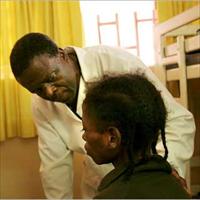BENIN: Flesh-eating Buruli ulcer ‘neglected disease’ spreads

A tropical flesh-eating disease, Buruli ulcer, is spreading across West Africa and has infected at least 40,000 people leaving them with bloody infected wounds and swollen skin ulcers, which at their worst, require surgery or amputation, according to the World Health Organization (WHO).
The disease has been reported in 30 countries around the world, mostly in poor, rural, tropical communities that live near water. In West Africa, according to WHO 2006 statistics, Ivory Coast has reported 24,000 cases, Ghana reported 11,000, and Benin has 7,000 confirmed cases.
Despite a 10-year global WHO-backed Buruli ulcer research initiative, researchers still do not know how the disease is spread, and whether water-born insects are to blame, as suggested by early research.
Even though the same bacteria family causes both Buruli ulcers and tuberculosis, Buruli ulcer disease receives far less international attention and remains one of the world’s most overlooked diseases, according to WHO.
‘I thought it was witchcraft’
A woman, who gives her name as Agnes, says it has been five years since she was diagnosed with Buruli ulcer disease. She lives in Agbanou, a rural town 60km from Benin’s economic hub, Cotonou. She told IRIN before her infection, she spent most her time working in marshlands.
“At the beginning, I felt pain everywhere, and then the skin on my feet hurt even more and started to change colours. Then I saw open wounds. I thought it was witchcraft, which is why I did not think to go to the hospital. Instead, I turned to a traditional healer,” said Agnes.
When her condition worsened, and the healer could not treat her deepening wounds, Agnes says she went to the hospital where doctors told her she had Buruli ulcer disease.
Roch Christian Johnson, director of Benin’s Program to Control Buruli ulcer disease, says unreported cases in Benin outnumber reported ones because lack of knowledge about the disease, illiteracy, poverty and traditional healing often prevent people from going to medical facilities.
Also, the disease has few noticeable symptoms at the beginning— painless swelling, no fever—according to WHO. Yet, without treatment, massive, bloody ulcers start tearing away the patient’s flesh.
Johnson says when it reaches this stage it can cost up to US$2,000 to cure the disease. Depending on how bad the ulcers are, the patient may need eight weeks of medicine, surgery, or in worst case scenario, amputation to fight the infection.
Hospital stays often last longer than three months; complications can lead to even costlier long-term disability, according to WHO.
Patient care is subsidised in part by the government and private foundations in Benin. But nevertheless, Johnson says the cost is still too much for many ulcer patients.
The average annual salary in Benin is US$570, based on 2008 World Bank figures.
Attacking the disease early
Faced with a rapidly spreading and largely unknown disease, and mounting health care costs, Benin’s government set up five testing centres throughout the country starting in 1998 to try and catch the disease early.
On average, about 80 people seek treatment or testing in these centres for Buruli ulcer every month, according to program director Johnson.
From 2003 to 2006, Johnson says health officials tested and treated 3,793 people. Out of the country’s 12 regions, eight, including the south with its 125km of open coastline, have reported infections.
The arid north has been spared.
Wiping out the disease?
Despite the fact that little is known about how the infection is spread, Johnson says he is still hopeful the disease can be controlled, “The prospects are good to progressively contain this disease in Benin. We are working with a large team of [local] researchers to learn all we can about this disease, which means, in the near future, the situation will improve. ”
Johnson says even if health officials do not know how the disease is spread, they can encourage people to get tested at government health centres, and to get treatment quickly to prevent the disease from consuming their flesh -- and finances.
WHO reports a vaccine, available in Benin, can offer some short-term protection against mycobacterium ulcerans bacteria, which causes the ulcers.
WHO’s Buruli ulcer Initiative lists as its research priorities learning how the debilitating bacteria is spread, developing a safe and effective long-term vaccine, and creating a simple, fast way to diagnose the disease.
 Back and Next - Back and Next
Back and Next - Back and Next See Also - See Also
See Also - See Also